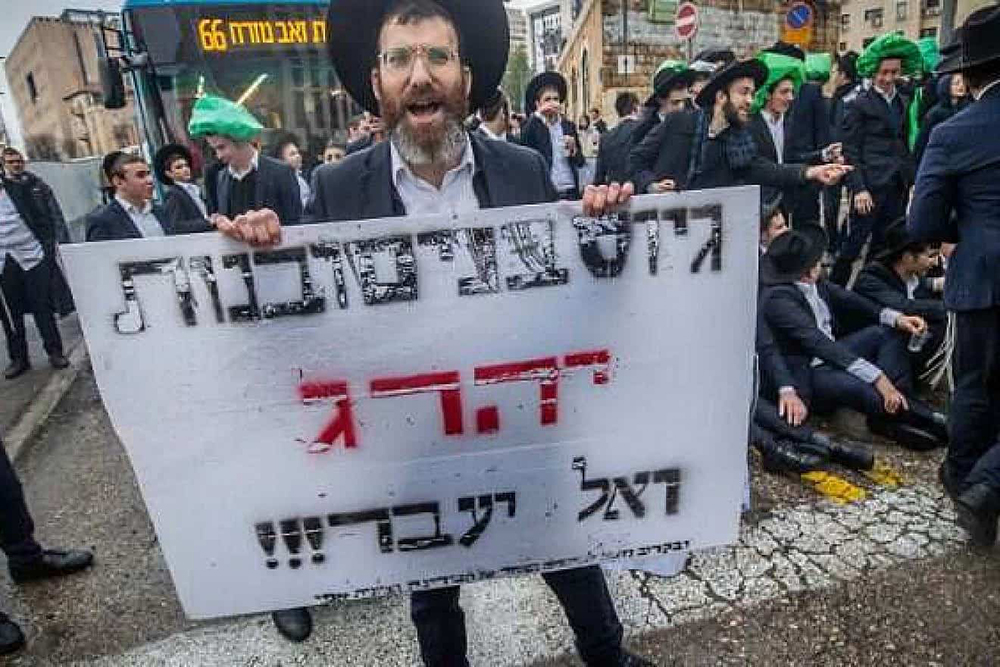|
Getting your Trinity Audio player ready...
|
Edited by: Fern Sidman
The ultra-Orthodox community in Israel has intensified its opposition to the Supreme Court’s recent ruling mandating the conscription of all ultra-Orthodox men, including yeshiva students, into the Israel Defense Forces (IDF). This week, Yated Ne’eman, a newspaper affiliated with the Lithuanian Degel HaTorah faction, published a front-page directive from Haredi leaders urging the community to reject draft notices, calling the ruling an attempt to harm Torah scholars, according to a report in The Jerusalem Post.
In its Sunday edition, Yated Ne’eman ran the headline, “It shall not come to pass,” encapsulating the community’s defiance. The directive accused authorities of intensifying efforts to undermine the Torah world by advancing what it described as a “conscription decree.” The Haredi leadership instructed yeshiva students and scholars to refrain from cooperating with the draft process, framing the Supreme Court’s ruling as a threat to their religious freedoms and way of life.
As reported by The JPost, Rabbi Dov Landau, a prominent leader of the Lithuanian Haredi community, declared: “We know full well that no yeshiva student or kollel scholar will join the army—under any circumstances and in any form whatsoever.” Yeshiva heads echoed these sentiments, urging students to remain steadfast against an existential threat to their religious identity.
The Supreme Court’s June 25th ruling overturned long-standing exemptions for yeshiva students under the “Torah as their profession” arrangement. The JPost report indicated that this legal shift has fueled tensions between the state and ultra-Orthodox communities, which view military service as incompatible with their religious commitments.
The JPost also reported that senior figures in United Torah Judaism (UTJ) and Shas were informed of the Defense Ministry’s plan to issue draft notices prior to its implementation. In response, both parties are advocating for new legislation that would fully exempt yeshiva students while conscripting a limited number of Haredi men—4,800 in the first year of the law’s enforcement.
The proposed legislation passed its first reading in the Knesset but has stalled due to opposition from then-Defense Minister Yoav Gallant and other coalition members. The report in The JPost mentioned that Haredi leaders remain optimistic, suggesting that Gallant’s removal may create an opening for the bill’s advancement.
Not everyone agrees with the ultra-Orthodox community’s stance. Opposition leader MK Yair Lapid condemned the directive, calling it a “national disgrace” and accused Haredi leaders of undermining the rule of law. “The instruction to yeshiva students is an insult to our soldiers and a public call to break the law,” Lapid stated, according to the information provided in The JPost report.
IDF data reveals that between 900 and 1,000 ultra-Orthodox men are currently serving in the military. Despite intensified conscription efforts, enlistment rates remain exceedingly low. In recent months, the IDF has issued over 3,000 draft notices and 930 arrest warrants for ultra-Orthodox individuals who failed to report for duty, as was noted in The JPost report. Since the Supreme Court ruling, only 48 Haredim have enlisted, underscoring the community’s resistance to conscription.
The ultra-Orthodox media has also entered the fray. Hamodia, a newspaper aligned with the Agudat Yisrael faction, sharply criticized Defense Minister Israel Katz for his role in enforcing the draft. In a scathing editorial, the paper accused Katz of perpetuating a failed process aimed solely at deepening the crisis with the Haredi community. “The defense minister continues a process doomed from the outset to resounding failure, whose sole purpose is to deepen the crisis with the Haredi community and continue the war against the Torah world,” the editorial stated, as reported by The JPost.
The ongoing dispute reflects deeper societal tensions in Israel over the role of religion, military service, and equality. For decades, the ultra-Orthodox community has been a focal point of debates over draft exemptions, with critics arguing that the current system places an unfair burden on secular Israelis. Conversely, Haredi leaders maintain that their religious study is integral to the nation’s spiritual well-being and should not be compromised.
The Supreme Court’s ruling and the subsequent fallout highlight the challenges of balancing these competing values. While the state seeks to ensure universal military service, the Haredi community views this as an infringement on their religious autonomy and identity.
As reported by The JPost, the path forward will require careful navigation to reconcile the demands of national security with the rights and traditions of Orthodox Jews.





